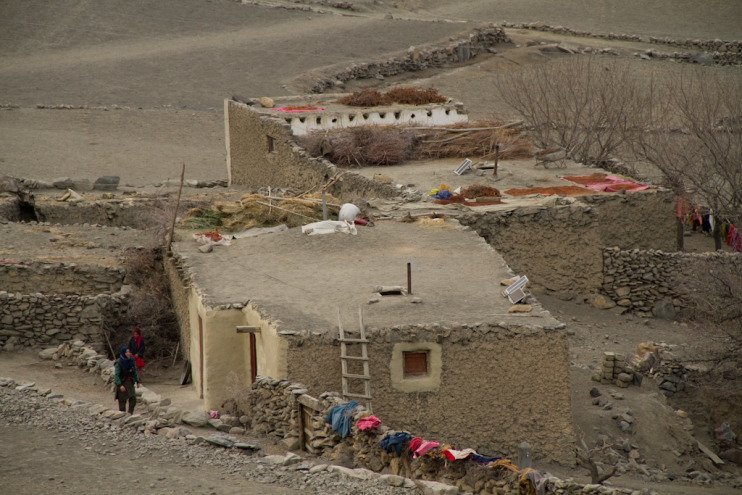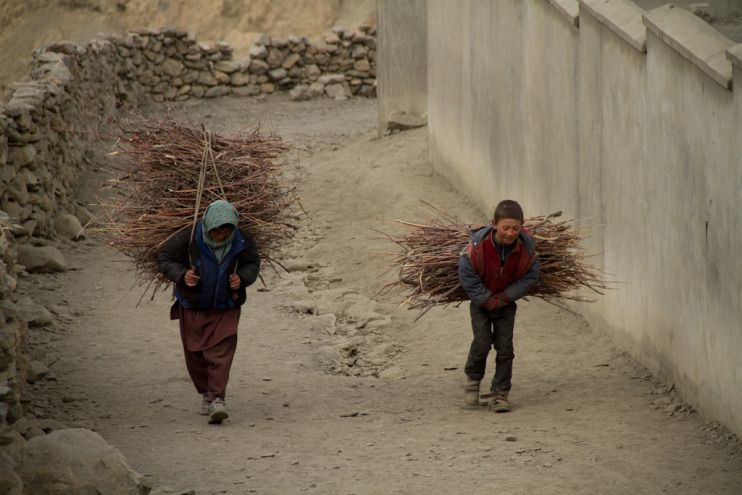Pakistan Winter Sport by Herve Barmasse
Once The North Face agreed to sponsor our expedition called “Pakistan Winter Sport,” I felt happy and motivated for this new adventure. But, at the same time, I felt a great responsibility upon me. Not only did we have the lofty alpine objectives of opening of new ice routes and long descents on skis in unexplored mountains, we sought to embrace humanistic and social motivations. As a mountain guide instructor and rescue specialist my goal was to share this knowledge by teaching at the Shimshal Climbing School. The intention was to help the high-altitude porters in this community progress, both in terms of safety and skills on technical mountain terrain. Furthermore, thanks to the collaboration of Dr. Marco Cavana, we were to organize a clinic to deal with medial problems linked to inadequate sanitation in the area.
2. Land Slide - 2010 Pakistan Winter Expedition from Kristoffer Erickson on Vimeo.
The Pakistani Winter, Shimshal and its porters
Shimshal Valley, 20 January 2010
We are only the fifteenth winter-alpine expedition in the history of Pakistan. I’m accompanied by alpinist Eneko Pou, photographer and alpinist Kristoffer Erickson, journalist and alpinist Oscar Gogorza and Dr. Marco Cavana. We are in the North, in the Baltistan Gilgit region, close to Afghanistan, near the border with China.
Unlike the summer, when fields of grain, trees and green pastures contrast the brown color of the rock and dry land, everything is now gray. It seems to us like a black and white film. It is even cold at low altitudes and above 1600 meters it’s completely frozen.
We creep along in our Jeep on a bumpy, disjointed road similar to a mule’s paths. The access road to the town of Shimshal was literally ripped into the mountain, thanks to the will power of its inhabitants. It was constructed without mechanical means over 23 years of hard work with a pick and shovel. This spectacular off-road adventure alone justifies a trip to Pakistan.
 Shimshal is a village of 2000 people, which has remained nearly completely isolated from the rest of Pakistan for 600 years. Although maintaining the Ishmaelite tradition, these people seem less rigid and more open than other muslims of the Pakistani mountains. Even the women allow this feeling to hold true when they respond to our waves with a smile. In the village there is no running water, no telephones or televisions. Only a few families have installed small solar panels that guarantee one meager light for three hours at a time during the long winter nights.
Shimshal is a village of 2000 people, which has remained nearly completely isolated from the rest of Pakistan for 600 years. Although maintaining the Ishmaelite tradition, these people seem less rigid and more open than other muslims of the Pakistani mountains. Even the women allow this feeling to hold true when they respond to our waves with a smile. In the village there is no running water, no telephones or televisions. Only a few families have installed small solar panels that guarantee one meager light for three hours at a time during the long winter nights.
There are three mosques and a school where students go after having gathered wood, which, here in Pakistan, is quite rare. All the students learn English and those who can afford it, at the age of 17, will continue their studies in Gilgit. There are no doctors and the nearest hospital (now you can get there in an hour, before the construction of the road it took six days) is in Gulmit, where a general practitioner oversees all the emergencies without the use of “sophisticated” medical equipment.
The community is very united and the inhabitants help each other as in a big family. Any problem is a problem for Shimshal and not for one single person.
Potatoes, rice, chapatti, dal, peas and beans are preciously rationed to make sure that they aren’t left without supplies before the next replenishment. Once in a while they get to eat goat or yak meat. Unlike the summer, there are not chickens because they wouldn’t survive the harsh temperatures of the winter months. The yak is also a characteristic of Shimshal. It is rare to encounter these animals in Pakistan but in the Shimshal valley, along the border with China, thousands of them exist in the wild.
The “malida” (chapatti, cheese, butter and salt), the “graal” (chapatti, spices, butter and salt) or the “chalpindook” (chapatti and cheese) are considered dishes of the poor in Pakistan and are typical of this region. They are eaten nearly everyday.
The temperature during the five winter months is consistently well below zero—from minus 12 to minus 20. Even inside around the hearth, it rarely gets above 5 degrees. During the winter, the landscape and it’s people patiently await the summer in the same way our ancestors did in the Alps, hundreds of years ago.
 Every house has a particular structure featuring a single room with a wood stove in the center and an opening in the roof. Each home welcomes the entire family: grandparents, parents and children. In the same room they cook, sleep and live their daily lives for generations. For the inhabitants of Shimshal the winter days always pass by in the same manner. In the morning the women prepare breakfast with tea and milk with chapatti dipped in melted butter. Before going to school the daughters go and collect wood or water. A spring, the only one that is not frozen, guarantees drinking water to the entire village. All day long women patiently wait their turn to fill their water jugs. The men build and maintain the houses, cut wood, put up the walls and await the summer to work as porters and high-altitude porters. In the village of Shimshal more than 40 people have climbed a mountain of 8000 meters and Rajab Shan, the only Pakistani to have climbed all of the 8000-meter peaks of the Karakorum was born here. He is considered a real hero in all of Pakistan.
Every house has a particular structure featuring a single room with a wood stove in the center and an opening in the roof. Each home welcomes the entire family: grandparents, parents and children. In the same room they cook, sleep and live their daily lives for generations. For the inhabitants of Shimshal the winter days always pass by in the same manner. In the morning the women prepare breakfast with tea and milk with chapatti dipped in melted butter. Before going to school the daughters go and collect wood or water. A spring, the only one that is not frozen, guarantees drinking water to the entire village. All day long women patiently wait their turn to fill their water jugs. The men build and maintain the houses, cut wood, put up the walls and await the summer to work as porters and high-altitude porters. In the village of Shimshal more than 40 people have climbed a mountain of 8000 meters and Rajab Shan, the only Pakistani to have climbed all of the 8000-meter peaks of the Karakorum was born here. He is considered a real hero in all of Pakistan.